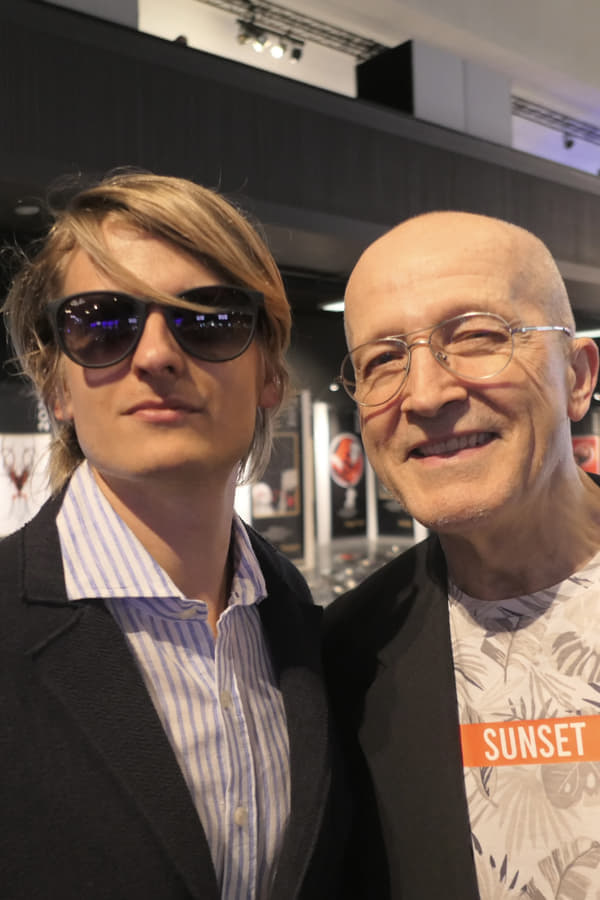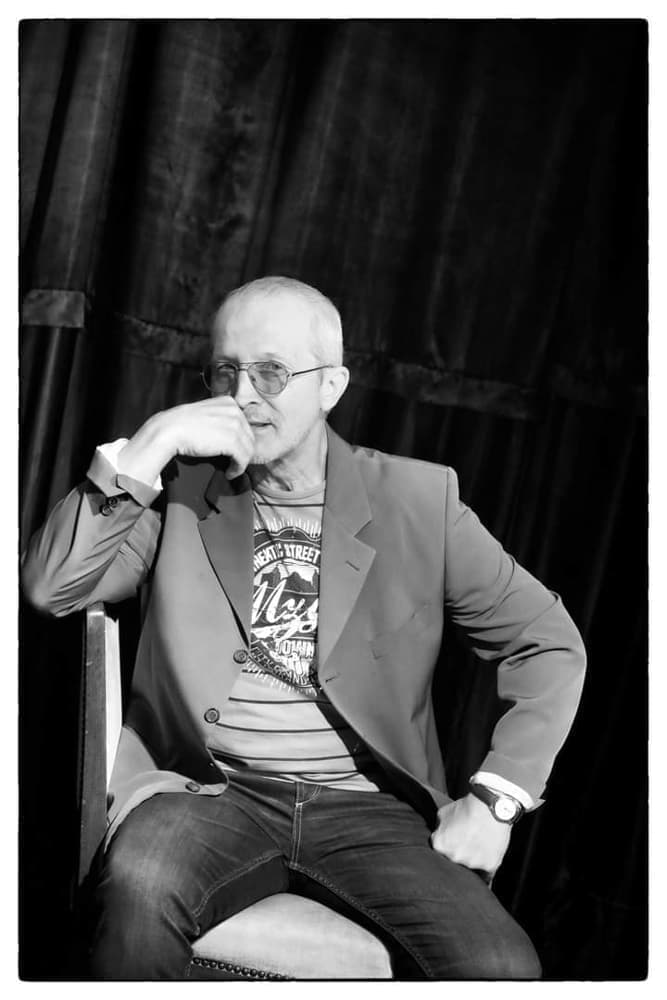Jean-Pierre Valère, whose real name is Jean-Pierre van Lerberghe, is a Belgian actor, weightlifting champion, and musician. He stars in Moloss (originally known as Lopak L’Envoûteur, Lopak the Enchanter), which premiered at the Brussels International Fantastic Film Festival, on August 31, 2022. Moloss is co-directed by Abdelkrim Qissi and Abel Ernest Tempo. (See Grégoire Canlorbe’s conversation with Abdelkrim Qissi).
Grégoire Canlorbe (GC): Are you happy with the screening of Moloss at the BIFFF [Brussels International Fantastic Film Festival]?
Jean-Pierre Valère (J-PV): Yes, very happy. I had the pleasure of meeting an excellent journalist in you, and I also got to meet the whole team of the film, so many wonderfully talented actors. It was like a crowning for us, in such magnificent setting, on the occasion of the great return of BIFFF after this devastating epidemic.

GC: What was the shoot like?
J-PV: It was an honor to film alongside friends, Abel Ernest Tembo and Abdelkrim Qissi. Ernest is remarkable as a director cameraman. I saw firsthand his great art. Restrained, unassuming, he knows how to direct his actors without seeming to direct them. The staging subtly and brilliantly alternates the intimate with the explosive. Our two friends Abdelkrim and Ernest, really, know how to hit all the right notes in a perfect symphony of collaboration.
GC: Did you like playing your character in the film?
J-PV: I am so grateful for the chance Ernest and Abdelkrim gave me to play this offbeat role—offbeat in just the right way. The bits of humor that the character brings, like when he tries to reassure Moloss, whose best friend he is, are a contrast to the many scenes of violence and the almost constant feeling of dread found in the film. It was a shooting like no other, an adventure like I had never experienced before, which I had the chance to share with all these heroes that are the other actors of the film, all of them remarkable. I hope that a sequel will be made. Terminator did it successfully, why not Moloss?
[Spoiler alert! Skip this question and its answer about the film for those who don’t want to know about a crucial revelation]
GC: A rather late revelation in the film is that your character, up till then, had been under the yoke of a hypnotic substance. How did you get into the skin of a character subject to such a chemical “spell?”
J-PV: I like subtle acting, whether I’m playing bastards (as in the RTL-TVI series Affaires de Famille) or funny and nice characters (as in Moloss). Many humorists, if they want to be funny, must be good comedians first and foremost. I tried to play my character in Moloss with nuance—to bring out the state of mind he is in by playing him, paradoxically, as if nothing had happened. Whether it’s the role I play in Moloss, or the role of a local “J.R.” character, a real scoundrel (I love that!) that I play in Affaires de Famille, it’s all about the look, and a sincere and natural performance.
[End of spoiler]
GC: Looking back on your weightlifting career, what do you see?
J-PV: A very weighty career, if I may say so, since I was a finalist at the Olympic Games in Mexico, Munich, and Montreal, with a silver medal at the 1970 world championships. He was very proud of his little track record, this Valère guy, who was then known by his real name, van Lerberghe.
GC: How does the art of using your hands as a musician differ from the art of using your hands as a weightlifter?
J-PV: Excellent question. As you know, I have been in love with music—especially piano and guitar—since I was a child. As someone who likes to play classical improvisation, I was surprised to find out that weightlifting does not alter (no pun intended) the flexibility of the fingers when playing musical instruments; these are two reflex actions of the finger muscles that are quite specific, each in its own way. I was afraid that I would not be able to play the guitar or the piano properly after a training session, but I was amazed to discover that weightlifting and music are perfectly compatible disciplines; and that the improvement of the first one does not compromise the improvement of the second, provided, of course, that weightlifting is not too time-consuming to take away time from music. But I think that an artist, whoever he or she may be, should cultivate versatility as much as these meager twenty-four hours a day allow.
GC: You played the main role in the Belgian TV-drama, Affaires de Famille (a total of 105 episodes, broadcast since 1996). What are your favorite TV-dramas?
J-PV: My interpretation of Didier Barillot in Affaires de Famille, with the influence of Dallas’ J.R., is one of the greatest satisfactions of my acting career, as is my recent interpretation of Moloss’ best friend. I hope to have the chance to play other roles of the same quality in the near future. I used to enjoy the series Dallas, but I don’t watch any series nowadays.
GC: Among the contemporary musicians, are some particularly dear to your heart as a music lover?
J-PV: Lang Lang, an extraordinary person and a virtuoso pianist capable of an infinite number of nuances; Khatia Buniatishvili, whose physical beauty is matched only by her sublime piano playing. But above all, the Beatles—under an apparent lightness, the most inspired and diversified geniuses of the 20th century!
GC: Jean-Claude Van Damme alone is nicknamed “The Muscles from Brussels,” even though such a qualification fits you just as well, if not more? What do you make of that?
J-PV: The reason is simple—Jean-Claude is world famous. Here’s an interesting anecdote in that regard. We were both training at the Centre National des Sports in Brussels, me in weightlifting, him in karate. One evening when we were the last two in the weightlifting room and were doing our abs side by side, he told me about his plans to go to America and make a career in cinema. As I didn’t want to break his momentum, I said it was a good idea, never believing for a second that anything would ever come of it, considering the competition he would have to face. But we know what happened. I called him one day. He was in London. I hadn’t seen him in, say, twenty years; but he was still as nice and friendly as ever, just surprised to hear from me.
GC: What do you remember about Vasily Alekseyev?
J-PV: Fortunately for me, we were not in the same category. He was classified as a super heavyweight, and I was classified as a light heavyweight. He weighed in at one hundred and seventy kilos, and I weighed in at less than ninety kilos. In Belgium, weightlifting was at that time a despised sport, so that everyone had to train alone in his cellar, without any real professional supervision. The Russians were pros, and we were amateurs, so to speak. That’s why I’m proud to be vice world champion!
GC: So, tell us about your friendship with heavyweight Serge Reding.
J-PV: A young man of incredible kindness! His shyness played tricks on him in competitions. He was as gifted as Vasily Alekseyev, if not more so, but he let himself be impressed by the Russian champion, who was not afraid of anything and who went through some formidable psychological training. When we both went to compete all over the world, it was always a wonderful adventure that we would remember for the rest of our lives; an initiatory journey to discover different civilizations. There is always something to learn and something to gain from meeting others—the calmness of New Yorkers in traffic, for example, or the eternal smile of the poorest of the poor.
GC: Are you still weightlifting?
J-PV: Now, I just do “maintenance of the machinery,” as they say. I go to a gym two or three times a week, with the idea of maintaining, as they say, the locomotor system and to prevent an inevitable loss of strength as one gets older. It is important to be able to keep one’s physical independence until the end. And, while we are at it, to maintain a well-balanced, or at least a presentable, body.
GC: You are a songwriter, with a particular penchant for love songs if I am not mistaken.
J-PV: My songs are not well known, but that doesn’t take away from the pleasure I take in writing them. I am a literary person above all else; some people ironically say that I speak like a book. I try, in any case, to bring a particular care to the choice of words, and to distil nuance, even humor.
GC: So, tell us about your favorite songs.
J-PV: I have a special affection for the Beatles’ songs, as they are practically the coming together of Mozart, Beethoven, Gershwin and rock. That four such talented musicians, John Lennon, Paul McCartney, Ringo Starr, and George Harrison, could team up is a unique event in the history of music! Other songs that blow me away every time I listen to them are the Eagles’ “Hotel California,” or Procol Harum’s “A Whiter Shade of Pale” (a wickedly slow song, as they used to say back then, with infinite poetry!); and Jean-Louis Aubert’s “Les Plages” (a wonder of nostalgia).
GC: By your own admission, you are a “literary man.” Who are your favorite French language writers?
J-PV: I must confess that I read relatively little, suffering from a problem with the eyes that, when too active, get tired very quickly. The little I have been taught about French and Greek philosophers has been a fundamental background for me. Victor Hugo, Alfred de Vigny, or Montaigne I do particularly like. But the one I really like and prefer is Chamfort (not the singer, the other one!), for that art of his which can express a strong idea in a short sentence. I invite everyone to read Chamfort’s Maximes et Pensées, which contains true philosophy, and whose discovery in my adolescence, a time when I was precisely in need of philosophy, was formative for me.
GC: Thank you for your time. Is there anything you would like to add or expand?
J-PV: “The most lost of all days is the one in which one has not laughed,” wrote Chamfort. I would humbly add that the worst periods in life are those when one finds oneself without the slightest project, which throws one into the darkest depression. One project that is occupying me at the moment is a book that I plan to call, modestly, A Guide to the Universe, a title that I hope will be catchy. I hope to have time to finish it (which brings us back to a subject we discussed earlier—the little time we have each day). I plan to put my thoughts on things in it, and I have written about 20 pages so far. I have a few songs with a touch of humor and irony that I would like to record in the studio, with guitar accompaniment by myself. A lot of work to do, but you know how versatility is an ideal that drives me.
I was happy to meet you. You are considerate in your interviews and let your interviewee express himself—which is so rare that it needs to be highlighted.
